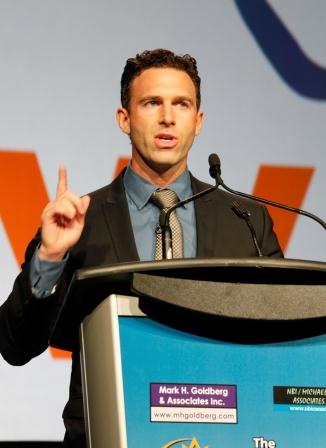
TORONTO – For those hoping Wind Mobile would continue to build from struggling start-up into a strong, fourth national wireless competitor, those hopes were dealt a major blow Monday when Globalive Wireless, Wind’s parent in Canada, officially pulled out of the 700 MHz wireless spectrum auction beginning Tuesday.
In a statement released Monday afternoon, the Canadian wireless upstart said "Wind Mobile’s shareholder VimpelCom decided not to fund Wind Mobile’s participation in this auction, but confirmed that it remains in discussions with the federal government and Wind Mobile’s other shareholder AAL Holding to craft a path forward that will continue to build Wind Mobile as a strong competitor in the Canadian wireless market.”
However, without more spectrum, doing that will prove tremendously difficult. Analysts speculated that to get what it needed to compete, Wind would have to spend in the neighbourhood of $200 million to acquire 700 MHz spectrum in the regions it currently operates (Southern Ontario, and the populous parts of B.C. and Alberta).
Amsterdam-based VimpelCom is controlled by Russian billionaire Mikhail Fridman and it has been attempting to re-organize and take control of the Canadian operations for more than a year, but Industry Canada has not approved the company’s application to alter the ownership structure (submitted in January 2013), leaving the company in limbo in Canada. CEO Tony Lacavera and his team have done their best to grow the company under extremely trying competitive and regulatory circumstances and find themselves at loose ends.
Add to that the federal government’s statements that it does not want to see spectrum set aside for new wireless entrants in the 2008 AWS auction sold to any of the incumbents even after the five-year moratorium ends, and the market available to VimpelCom to sell is limited. Said Industry Minister James Moore when Telus purchased Public Mobile in 2013: “We will not approve any spectrum transfer request that decreases competition in our wireless sector to the detriment of consumers,” which most have taken to mean that the federal government will not let Bell, Telus or Rogers buy Wind or Mobilicity’s spectrum assets.
Without more spectrum, Wind can only grow so big and without 700 MHz spectrum, upon which Verizon and AT&T have built their LTE networks in the States and which has tremendous distance and building-penetration advantages – rendering it an excellent vehicle for data-heavy applications, especially video – Wind will be at an even deeper competitive disadvantage than it already is as a wireless-only carrier in the age of bundled services.
Lacavera was unbowed, however, tweeting yesterday:
<blockquote class="twitter-tweet" lang="en"><p>It is business as usual at Wind – we do need more spectrum so I am not happy we had to withdraw from 700 but onwards and upwards for here!</p>— Tony Lacavera (@TonyLacavera) <a href="https://twitter.com/TonyLacavera/statuses/422856445391298560">January 13, 2014</a></blockquote><script async src="//platform.twitter.com/widgets.js" charset="utf-8"></script>
Wind spent more than $440 million in the 2008 AWS spectrum auction and was seen as the wild card bidder then which caused the auction to continue for weeks and, in part, to force proceeds north of the $4 billion mark. They came on strong, but Canadians, for many reasons, by and large stuck with the Big Three.
With Wind out now and with just 10 bidders left, it’s expected the Canadian 700 MHz auction will bring in less than half of that amount of revenue and from just the usual suspects.
However, Quebecor’s cable and wireless company Vidéotron could be the wild card in this auction, should it decide to expand beyond its home province of Quebec. While most see this as highly unlikely, one analyst pointed out in a note to clients that Videotron has signed a non-disclosure agreement with Mobilicity, the tiny wireless company currently operating under bankruptcy protection serving customers in Toronto, Ottawa, Edmonton, Calgary and Vancouver. “We believe (Quebecor/Vidéotron) signed an NDA with Mobilicity, which indicates it has some interest in licenses outside of Quebec,” wrote Scotia Capital telecom analyst Jeff Fan on Friday.
If it does want to make waves and expand Vidéotron “may leverage the licenses to gain a more favorable network sharing deal with RCI (in Quebec) or become a solution to the government’s 4th operator objective in BC, AB and ON with a network sharing arrangement with Wind/Mobilicity that may also include an incumbent like Rogers,” added Fan in his Friday note. If the company does then pursue licenses outside Quebec, it would bring the total auction cost and Quebecor’s cost higher than expected, he wrote. However, now not having to bid against Wind, it could make Vidéotron’s path into the rest of Canada cheaper, should it surprise everyone and make that aggressive move.
We’ll find out soon enough. Industry Canada will announce the list of provisional winners five days after the auction ends – but it won’t be telling anyone just when the auction wraps up. That said, ministry officials said in a technical briefing on Monday that these combinatorial clock auctions (which involves many folks at Industry Canada and inside the offices of the various bidding companies sitting in front of computers running custom software and securely communicating online) have taken anywhere from two to seven weeks in other jurisdictions. Hopefully it won’t run for two months, as did the AWS auction.



